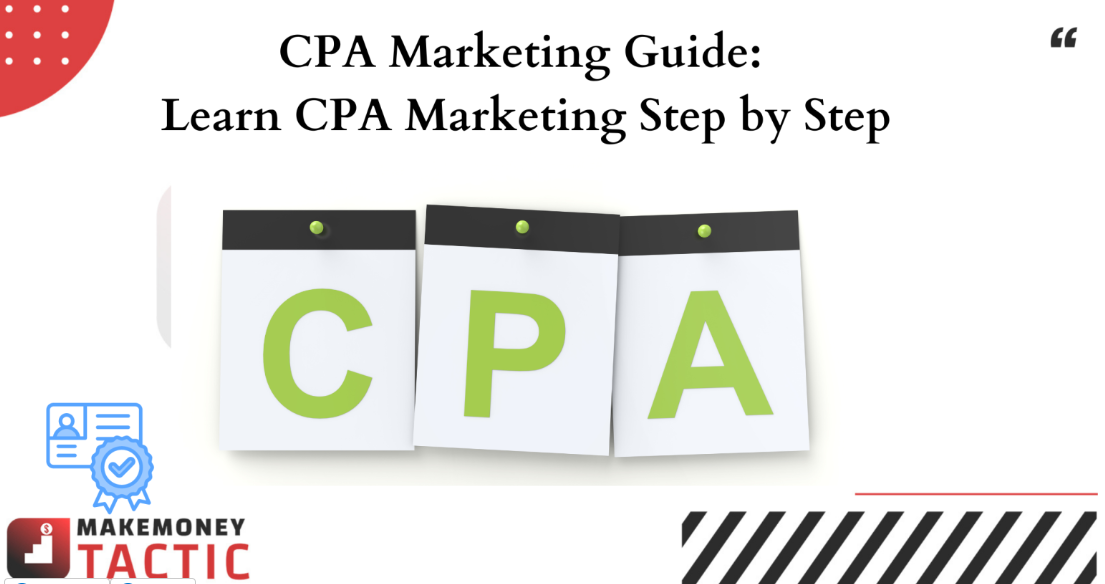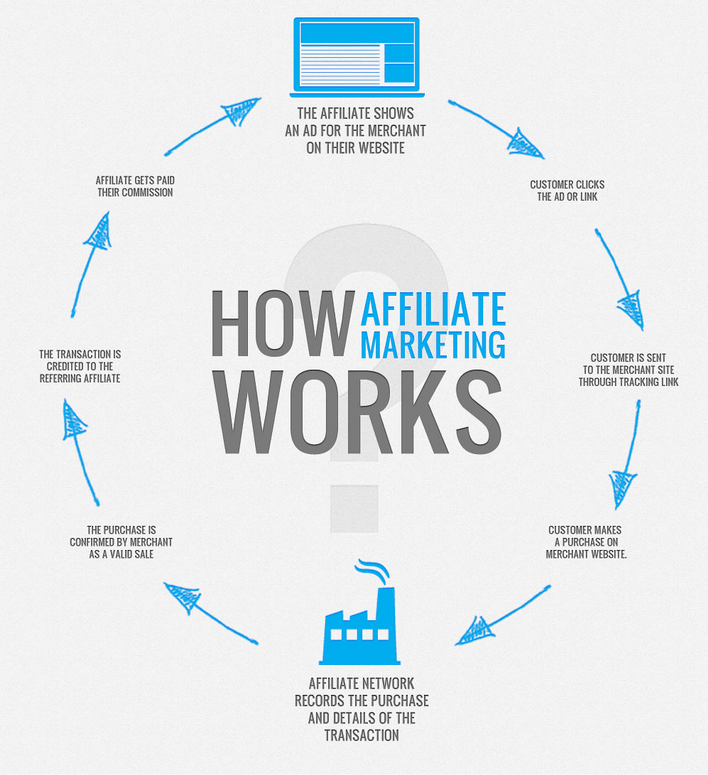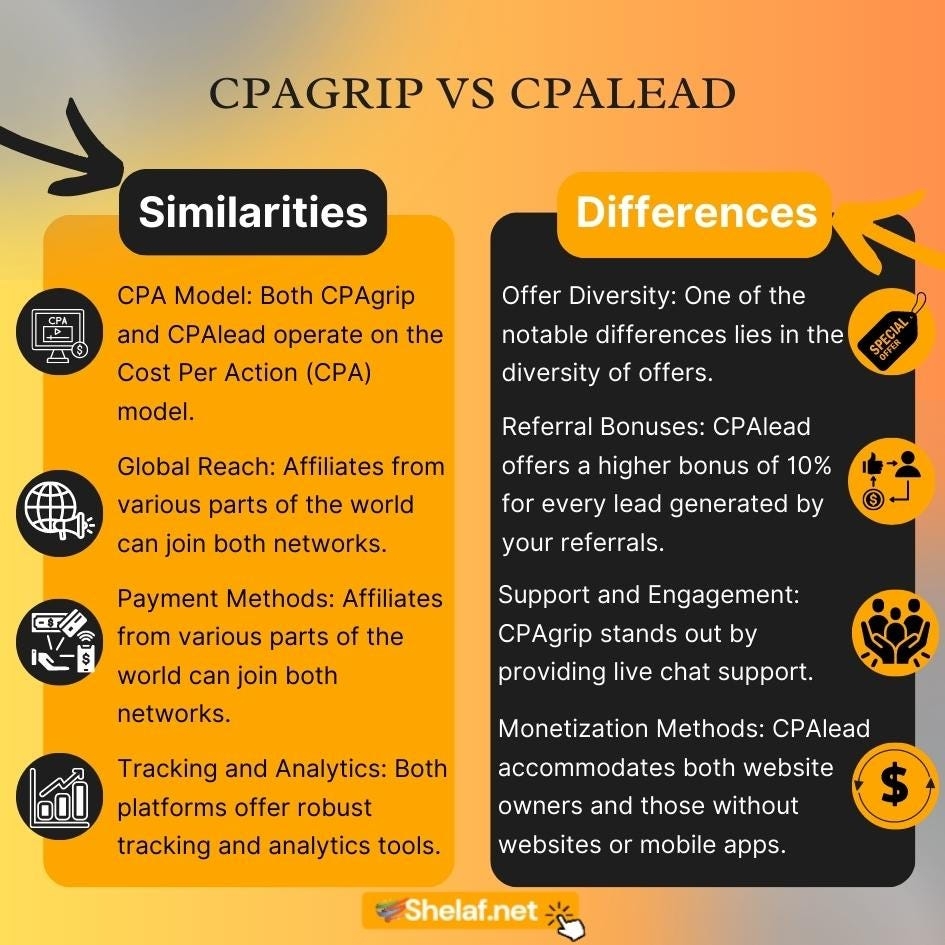How to Choose the Best Option for Your Business
Buy CPC Traffic | Buy Display Ads | Exclusive traffic sources | Buy Push Ads | Popunder ADS | Buy Native Ads | Buy Preroll Ads

Buy CPC Traffic | Buy Display Ads | Exclusive traffic sources | Buy Push Ads | Popunder ADS | Buy Native Ads | Buy Preroll Ads
When it comes to monetizing your online presence, there are numerous options available, two of the most popular being CPA (Cost Per Action) networks and affiliate marketing. Both strategies offer a way to generate income by promoting products or services, but they operate in distinct ways. Understanding the differences between CPA networks and affiliate marketing is essential in determining which approach best suits your goals and objectives.
CPA networks are platforms that connect advertisers and publishers, facilitating a commission-based model where publishers earn money for every specific action taken by their audience. These actions can range from submitting a form, making a purchase, or downloading an app. The advantage of CPA networks is that they provide a wide range of offers and higher payouts for successful conversions. However, they often require stricter regulations and may have more stringent entry requirements.
Affiliate marketing, on the other hand, involves promoting products or services on behalf of a merchant, typically through a custom referral link. When someone clicks on the link and makes a purchase, the affiliate earns a commission. Unlike CPA networks, affiliate marketing offers more flexibility in terms of the products or services you can promote. It also provides the opportunity to build a long-term relationship with your audience and earn recurring commissions. However, finding profitable affiliate programs may require more effort and research.
Cpa Network
A CPA network, or Cost-Per-Action network, is a platform that connects advertisers and publishers in the world of affiliate marketing. CPA networks act as intermediaries, providing a centralized hub where advertisers can offer various actions for publishers to promote and earn commissions on.
How does it work?
CPA networks work on a performance-based model, meaning that publishers only get paid when specific actions are completed by users referred through their promotional efforts. These actions could include making a purchase, signing up for a newsletter, filling out a form, or any other action specified by the advertiser.
Advertisers join CPA networks to promote their products or services and attract new customers. They set specific criteria for the actions they want users to complete and determine the commission rates for each action. Advertisers also provide promotional materials such as banners, landing pages, and tracking links for publishers to use.
Publishers, on the other hand, join CPA networks to find offers that align with their target audience and promotional strategies. They select the offers they want to promote from the CPA network's platform, and then drive traffic to these offers through various channels such as websites, social media, email marketing, or search engine marketing.
Benefits of CPA networks
CPA networks offer several advantages for both advertisers and publishers:
Wide range of offers: CPA networks provide a diverse selection of offers from different advertisers, allowing publishers to choose the most suitable ones for their audience.
Centralized tracking and payment: CPA networks handle all the tracking and payment processes, ensuring accurate calculation of commissions and timely payouts for publishers.
Access to affiliate tools: CPA networks often provide publishers with various tools and resources to optimize their promotional efforts, including advanced tracking software, analytics, and marketing materials.
Support and guidance: CPA networks typically offer support and guidance to publishers, helping them enhance their campaigns and maximize their earnings.
In summary, CPA networks play a crucial role in the world of affiliate marketing by connecting advertisers and publishers and facilitating the promotion of various offers. They offer benefits such as a wide range of offers, centralized tracking and payment, access to affiliate tools, and support for publishers to thrive in their affiliate marketing endeavors.
What is a CPA Network?

A CPA Network, or Cost Per Action Network, is a platform that connects advertisers with publishers in the affiliate marketing industry. It acts as an intermediary, facilitating the relationship between advertisers who want to promote their products or services, and publishers who earn a commission for promoting those offers. CPA networks play a crucial role in the affiliate marketing ecosystem by providing a platform where advertisers and publishers can find each other and collaborate on campaigns.
Unlike traditional affiliate marketing, where publishers earn a commission based on sales or leads generated, CPA networks allow advertisers to pay publishers based on specific actions taken by users, such as filling out a form, signing up for a trial, or completing a purchase. These action-based commissions are often more attractive to advertisers because they allow for better tracking and measurement of campaign performance.
When advertisers join a CPA network, they gain access to a wide range of publishers who are already experienced in promoting offers and driving conversions. Publishers, on the other hand, can choose from a variety of offers available on the network and promote those that align with their audience and interests.
CPA networks typically provide publishers with tracking tools, reporting dashboards, and payment systems to streamline the process of promoting offers and receiving commissions. Additionally, they may offer support and resources to help publishers optimize their campaigns and maximize their earnings.
Overall, CPA networks serve as a crucial component of the affiliate marketing industry, connecting advertisers and publishers while providing the necessary tools and resources to ensure successful campaigns. If you're interested in getting started with affiliate marketing or looking for new opportunities to promote offers, joining a CPA network like rtb advertising can be a valuable step towards achieving your goals.
How Does a Cpa Network Work?

A Cost Per Action (CPA) network is a platform that connects advertisers with publishers to promote their products or services. It operates on a performance-based model, where publishers are compensated whenever a specific action is completed by a user referred from their marketing efforts.
1. Advertiser Sign-Up
The first step in the CPA network process begins with advertisers signing up to the network. Advertisers provide details about their products or services and their desired target audience. They also set the criteria for the specific actions they want users to take, such as making a purchase or signing up for a newsletter.
2. Publisher Sign-Up
After advertisers sign up, publishers can join the CPA network. Publishers may have websites, blogs, or other marketing channels with an established audience. They can choose from a variety of offers available on the network that align with their audience's interests and preferences.
3. Offer Selection
Publishers browse through the available offers and select the ones they want to promote. Each offer has specific requirements and payout rates, which publishers consider before making their selection. The offers can vary from lead generation and email submissions to product sales and app installs.
4. Promoting the Offers
Once publishers have selected the offers, they can start promoting them through various marketing channels, such as their websites, social media, email campaigns, or paid advertising. They use unique tracking links provided by the CPA network to track the performance and conversions of their marketing efforts.
5. User Actions and Conversions

When a user clicks on the publisher's tracking link and performs the desired action, such as making a purchase or filling out a form, the CPA network records the conversion. The network verifies the action's validity and attributes it to the specific publisher responsible for the referral.
6. Compensation and Payouts

Based on the agreed-upon terms, the CPA network calculates the earnings for publishers based on the completed actions and conversions. The network handles the payout process, ensuring timely and accurate compensation to publishers based on the rates and terms set by the advertisers.
In summary, a CPA network serves as an intermediary between advertisers and publishers, facilitating the promotion and monetization of offers through various marketing channels. It provides a transparent and efficient platform for advertisers to reach their target audience and for publishers to earn revenue based on the actions and conversions generated from their marketing efforts.
Affiliate Marketing

Affiliate marketing is a popular online marketing strategy where marketers promote a product or service and earn a commission for every sale they generate through their marketing efforts. It is a performance-based marketing model where affiliates are rewarded for driving traffic or providing leads that result in a conversion.
One of the main advantages of affiliate marketing is that it allows individuals to become entrepreneurs without the need to create or own their own products. Affiliate marketers can choose from a wide range of products and services to promote, allowing them to cater to different niches and audiences.
To start affiliate marketing, individuals need to join an affiliate program or network where they can find offers to promote. These networks act as intermediaries between advertisers (also known as merchants or vendors) and affiliates (also known as publishers or promoters). The network provides tools, tracking systems, and payment processing for affiliates, making it easier for them to track their performance and receive commissions.
Once affiliates choose an offer to promote, they can begin their marketing efforts, which can include creating content, generating traffic through SEO or paid ads, and engaging with their audience through social media or email marketing. The success of an affiliate marketer often depends on their ability to build trust with their audience and effectively promote the products or services they are affiliated with.
Affiliate marketing offers a flexible and scalable income opportunity, as affiliates can work from anywhere with an internet connection and can potentially earn passive income once their marketing efforts start to generate consistent sales. However, it is important for individuals to understand that affiliate marketing requires dedication, continuous learning, and staying up to date with industry trends in order to be successful.
Advantages of Affiliate Marketing:
Low investment and startup costs
No need to create your own product
Wide range of products and niches to choose from
Flexible work schedule
Potential for passive income
Disadvantages of Affiliate Marketing:
Competition from other affiliates
Dependence on the success of the chosen product or service
Continuous learning and adaptation to industry changes
Uncertainty in income due to fluctuating market conditions
In conclusion, affiliate marketing is a popular and accessible way for individuals to earn income online. It offers the flexibility to work from anywhere and the potential for passive income. However, it requires dedication, continuous learning, and effective marketing strategies to be successful in this competitive industry.
What is Affiliate Marketing?
Affiliate marketing is a performance-based marketing strategy in which an individual or a company (the affiliate) promotes and sells products or services of another company (the advertiser) on their own platform or website. The affiliate is rewarded with a commission for every sale or action generated through their referral.
Affiliate marketing operates on the principle of revenue sharing. It allows individuals or businesses to earn passive income by leveraging their existing audience or online presence to drive traffic and sales to the advertiser's website. This makes it an attractive option for anyone looking to monetize their website or online platform without the need to create and maintain their own products or services.
How Does Affiliate Marketing Work?
In affiliate marketing, the process typically involves four parties:
The affiliate: Also known as the publisher or the promoter, the affiliate is the individual or company that promotes the advertiser's products or services. They earn a commission when their referral leads to a successful sale or conversion.
The advertiser: Also known as the merchant or the vendor, the advertiser is the company that owns the products or services being promoted. They provide the affiliate with marketing materials, such as banners, links, or product data feeds, to facilitate the promotion.
The customer: The customer is the individual who purchases or interacts with the advertiser's products or services, usually through the affiliate's referral.
The affiliate network or platform: Often acting as an intermediary, the affiliate network or platform facilitates the relationship between the affiliate and the advertiser. It provides tracking and reporting tools, as well as handles the payment process between the parties involved.
When a customer clicks on an affiliate's unique tracking link or banner and makes a purchase or performs a desired action on the advertiser's website, the affiliate is credited for the referral. The affiliate network or platform tracks these referrals and ensures that the commissions are accurately calculated and paid to the affiliate.
Affiliate marketing offers a win-win situation for both affiliates and advertisers. Affiliates have the opportunity to earn passive income by promoting products or services they believe in, while advertisers can leverage the affiliate's existing audience to expand their reach and increase sales.
How Does Affiliate Marketing Work?
Affiliate marketing is a performance-based marketing model where individuals, referred to as affiliates or publishers, earn a commission by promoting products or services of a company or advertiser. It is a cost-effective way for businesses to drive sales because they only have to pay affiliates when a specific action, such as a sale or lead, is generated.
Affiliate Marketing Process
The process of affiliate marketing involves three main players: the advertiser, the affiliate, and the customer.
1. Advertiser

The advertiser is a company or business that wants to increase sales or leads for their products or services. They create an affiliate program and provide the necessary marketing materials, such as banners, links, or product feeds, for affiliates to promote their offers.
2. Affiliate
An affiliate is an individual or website that promotes the advertiser's products or services to drive traffic and sales. Affiliates typically have a website or a platform where they share content related to the advertiser's niche. They use their unique affiliate link to track the sales or leads generated by their promotional efforts.
Affiliates can choose from various promotional methods, such as writing product reviews, creating informative content, running advertising campaigns, or leveraging social media. They earn a commission or a percentage of the sale value whenever someone makes a purchase or completes a specific action through their affiliate link.
3. Customer

The customer is the end-user who clicks on the affiliate's promotional content and performs the desired action, such as making a purchase or signing up for a service. The customer may or may not be aware that their purchase is a result of affiliate marketing.
When a customer clicks on an affiliate link and completes the desired action, the affiliate network or program tracks and records the transaction. The affiliate network then attributes the sale or lead to the respective affiliate and calculates their commission based on the agreed-upon terms.
Affiliate marketing is a win-win situation for all parties involved. The advertiser benefits from increased sales and brand exposure, the affiliate earns a commission for their promotional efforts, and the customer discovers products or services that they may find valuable.
Cost-effective for advertisers.
Wide reach and exposure through affiliates' networks.
Performance-based model: Pay only for results.
Potential for passive income for affiliates.
Competition among affiliates.
Reliance on the advertiser's product or service quality.
Tracking and attribution challenges.
Requires continuous effort to generate consistent income.
Differences Between Cpa Network and Affiliate Marketing
CPA Network and affiliate marketing are both popular strategies used by companies to promote their products or services and generate sales. While they share some similarities, there are key differences that set them apart.
Payment Structure:
In CPA Network, affiliates are paid on a cost-per-action basis. This means that affiliates earn a commission for a specific action, such as a sale, lead, or download. On the other hand, affiliate marketing typically operates on a commission-based structure, where affiliates earn a percentage of the total sale amount.
Offer Types:
In CPA Network, affiliates have access to a wide range of offers, including lead generation, trial offers, email submissions, and more. Affiliate marketing, on the other hand, often focuses on promoting products or services through product reviews, comparisons, and recommendations.
Relationship with Advertisers:
In CPA Network, affiliates usually have a more direct relationship with the advertisers. They have access to exclusive offers and can negotiate customized terms and conditions. In affiliate marketing, affiliates typically have a more indirect relationship with the advertisers, as they work through an affiliate network or platform.
Tracking and Analytics:
CPA Networks often provide advanced tracking and analytics tools to help affiliates optimize their campaigns and track their performance. In affiliate marketing, tracking and analytics are also available, but the level of sophistication may vary depending on the network or platform used.
Level of Control:
In CPA Network, affiliates have more control over the offers they promote and the campaigns they run. They can choose which offers to promote, create their landing pages, and employ various marketing tactics. In affiliate marketing, affiliates have less control, as they are often provided with pre-made banners, links, and marketing materials by the advertiser or affiliate network.
In conclusion, while CPA Network and affiliate marketing have some similarities, they differ in terms of payment structure, offer types, relationship with advertisers, tracking and analytics capabilities, and level of control. Depending on your goals and preferences, one approach may be a better fit for you than the other.
Commission Structure
One of the key differences between CPA networks and affiliate marketing lies in their commission structures. Understanding the commission structure of each model is crucial for determining which one is the right fit for you.
In affiliate marketing, commissions are typically based on a percentage of the sale. This means that affiliates earn a percentage of the revenue generated from each sale they refer. The percentage can vary significantly depending on the product or service being promoted and the affiliate program's terms and conditions.
On the other hand, CPA networks offer commissions based on specific actions taken by the referred customer. These actions could include filling out a form, making a purchase, subscribing to a newsletter, or downloading an app. CPA networks provide a flat fee or a variable fee based on the action performed, rather than a percentage of the total sale.
Affiliate marketing's commission structure can be appealing for affiliates who are confident in their ability to generate high-value sales or conversions. They have the potential to earn higher commissions if they can drive significant sales or conversions. However, the downside is that the commission is tied to the sale amount, and affiliates may earn less for lower-value sales.
For affiliates who prefer a more predictable commission structure, CPA networks may be the better option. With CPA networks, affiliates receive a fixed or predetermined amount for each specified action, regardless of the sale amount. This can be advantageous for affiliates who are skilled in driving large volumes of traffic or generating a high number of leads but may not necessarily result in high-value sales.
Ultimately, choosing between CPA networks and affiliate marketing depends on your individual goals and strengths. If you excel at driving high-value sales and want the potential for higher commissions, affiliate marketing may be the way to go. However, if you prefer a more predictable commission structure and are skilled at driving large volumes of traffic or leads, CPA networks may be a better fit.
What is the difference between CPA network and affiliate marketing?
The main difference between CPA network and affiliate marketing is the way in which affiliates are compensated. In CPA networks, affiliates are paid based on specific actions, such as a sale, lead, or sign-up, that they generate. In affiliate marketing, affiliates are typically paid on a commission basis for every sale they refer. Additionally, CPA networks often require approval from both advertisers and affiliates, while affiliate marketing programs are generally more open to anyone who wants to join.
Which one is more suitable for beginners - CPA network or affiliate marketing?
For beginners, affiliate marketing may be a better choice. Affiliate marketing programs are generally more open and accessible, allowing beginners to join without the need for approval. In CPA networks, the approval process can be more strict and may require some prior experience or a proven track record. It's important for beginners to start with affiliate marketing to gain experience and understanding before moving on to CPA networks.
Can I do both CPA network and affiliate marketing at the same time?
Yes, it is possible to do both CPA network and affiliate marketing at the same time. In fact, many affiliates use a combination of both methods to maximize their earnings. You can join affiliate marketing programs and promote products to earn commissions, while also participating in CPA networks to generate income from specific actions. However, it's important to carefully manage your time and resources to ensure you can effectively manage both types of marketing.
What are some popular CPA networks and affiliate marketing programs?
There are several popular CPA networks, including MaxBounty, PeerFly, and ClickDealer. These networks offer a wide range of offers and have a good reputation among affiliates. As for affiliate marketing programs, some popular options include Amazon Associates, Commission Junction, and ShareASale. These programs allow affiliates to promote a variety of products and earn commissions based on sales and referrals.
Which one is more profitable - CPA network or affiliate marketing?
Both CPA network and affiliate marketing have the potential to be profitable, but it ultimately depends on your approach and strategy. CPA networks can offer higher payouts for specific actions, but they may also have more stringent requirements and competition. On the other hand, affiliate marketing allows for a wider range of products and can provide passive income through recurring sales. It's important to evaluate your goals and capabilities to determine which option is more suitable for you.
Buy CPC Traffic | Buy Display Ads | Exclusive traffic sources | Buy Push Ads | Popunder ADS | Buy Native Ads | Buy Preroll Ads
2022-2024 @ Cpa Network vs. Affiliate Marketing: Understanding the Differences and Finding the Right Fit for You